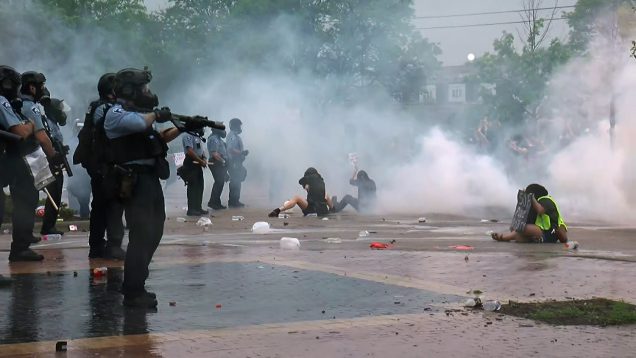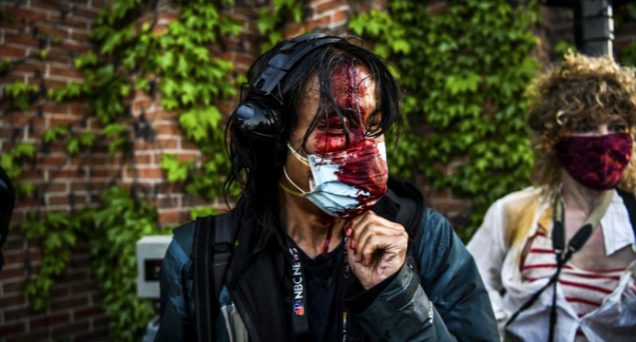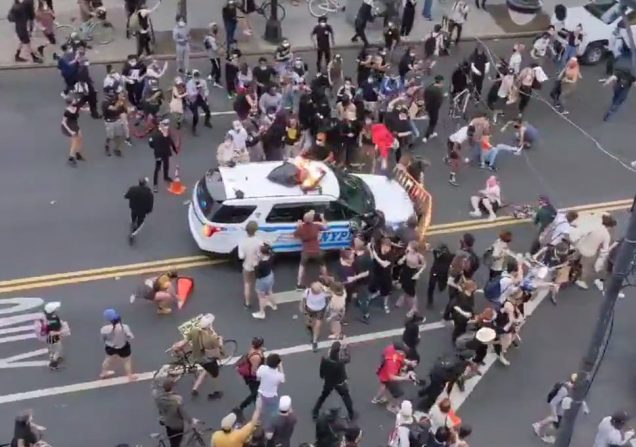Protesting and The Vicarious Trauma That Can Result From It.

In this day and age we as a nation are facing unprecedented times. From the spread of a new virus which is causing many unforeseen deaths to the protests, riots, and violence taking place due to the alarming death of George Floyd, it appears to be one traumatic event after another. The death of George Floyd has brought out numerous people around the world to stand up for the injustice and racism that took place. Many people questioned why now? Why such a large body of people for George Floyd? He is not the first African American to die in police custody. Frank Leon Roberts, an activist who teaches a course on the Black Lives Matter movement at New York University mentions that there are a number of different factors that can answer those questions.
Floyd’s death was particularly “gruesome, obvious, and clearly recorded on video as opposed to previous instances of police violence where there was partial view of what happened, or the police officer says they made a split-second decision because they feared for their life”. Floyd’s death comes during a pandemic and high unemployment, Roberts states “the US’s 13% unemployment level means that more people than usual can protest and campaign without juggling work commitments”. Floyd’s death also came shortly after the deaths of Ahmaud Arbery and Breonna Taylor and is considered the last straw. Also, the action of the police which forcibly removed peaceful protesters from a square outside of the White House can be considered another reason why many people come out to protest (Cheung, 2020).

George Floyd protests on May 31, 2020
When we look at media outlets during the last three weeks we see protests all over the U.S. both peaceful and violent. The violent protests depict by both photographs and videos a sense of fear, outrage, sadness, and disgust to the viewer. Watching these photographs and videos of real-life violence can cause vicarious trauma for many people both adults and children. Some who may have been personally affected by these experiences in the past and are reliving them again today.
The experience of trauma does not need to be direct to have an impact on us. Just being witness to trauma in this course can be challenging (Rousseau, 2020). Vicarious traumatization has been known to affect mental health providers, first responders, medical professionals, and other professionals who are exposed to trauma daily. Yet, according to the U.S. Veterans Administration, research generally finds an association between watching media coverage of traumatic events and stress symptoms. Research also found that traumatic materials in the media can lead observers to experience anxiety, difficulties in coping, immense fear, and feelings of helplessness, especially in children (USVA, 2020).

Dr. Stephanie Moulton Sarkis, a Tampa-based therapist and expert in the psychological effect of trauma, mentions that “a lot of people are reporting having nightmares about being abused by police right now.” This is proving to be true amongst many therapists. Dr. Sarkis continues to state that during this time she has seen patients that who have been victims of domestic violence and have say that watching footage is bringing up issues relating to when they have been victimized (Seitz, 2020).
These protests, riots, and violence that is taking place are causing vicarious trauma to both citizens and law enforcement officers. According to a study published by the Pew Research Center, more than three-quarters of U.S. law enforcement officers say they are reluctant to use force when necessary, and nearly as many (72%) say they or their colleagues are more reluctant to stop and question people who seem suspicious as a result of increased scrutiny of police stemming from the death of Michael Brown in 2014 (Madhani, 2017). These same effects can be expected from the death of George Floyd. It effects everyone’s day to day lives.
The media is something we can not get away from. News is presented to us through so many platforms like television coverage, social media, the internet, radio, and newspapers. There is no way to eliminate the news and the vicarious trauma it brings. You have to try to come to an understanding that bad things happen in this world and sometimes to specific individuals. Limit yourself to what you view and protect yourselves from the trauma it may bring by identifying any warning signs and talking about your feelings with a professional, friend, or loved one. This can be a start to addressing the symptoms of vicarious trauma.
Reference
Cheung, H. (2020, June 8). George Floyd death: Why US protests are so powerful this time. Retrieved from https://www.bbc.com/news/world-us-canada-52969905
Madhani, A. (2017, Jan. 11).’Ferguson effect’: 72% of U.S. cops reluctant to make stops. Retrieved from https://www.usatoday.com/story/news/2017/01/11/ferguson-effect-study-72-us-cops-reluctant-make-stops/96446504/
Rousseau, D. (2020). Module 1: Introduction to Trauma. Retrieved from https://onlinecampus.bu.edu/webapps/blackboard/execute/displayLearningUnit?course_id=_65989_1&content_id=_7783428_1&framesetWrapped=true
Seitz, M. (2020, June 9). The Quiet Trauma of Watching Police Brutality on Our Screens. Retrieved from https://www.vulture.com/2020/06/police-brutality-footage-vicarious-trauma.html
U.S. Department of Veterans Affairs. (2020). Retrieved from https://www.ptsd.va.gov/professional/treat/care/toolkits/provider/workingWithTraumaSurvivors.asp
2 comments
Raceel,
Great topic as it relates to the current events going on around us. The idea of vicarious trauma on first responders is one I had not thought about during these protests. It is incredible how the media is shaping the thoughts and actions of police officers, as you state almost 3/4 of them are more hesitant to use force and question suspicious people for fear of pushback. Yikes!
Raceel,
Thank you for sharing! I find this very helpful as I sometimes do tend to find myself beginning to feel a little overwhelmed by the current situation of racial injustice and the protests at times. It is being projected everywhere, yet it is something that is very important and I believe is a topic that should create that feeling as it creates needed action. I appreciate that you discuss the reasons as to why the eruption of the protests as that is an important detail. Recognizing the vicarious trauma that may be induced by the media is a step towards creating a balance and seeking when to make adjustments for a balanced sense of being. Thank you Raceel!
Comments are closed.